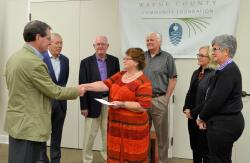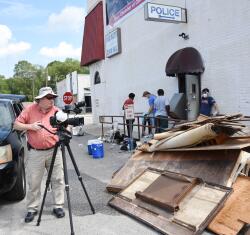It’s been 16 months since Hurricane Matthew’s devastating floods hit the eastern part of our state, and the North Carolina Community Foundation Disaster Relief Fund is still hard at work.
It’s no surprise to those still involved with recovery. Consider the numbers, staggering by any measure. The October 2016 storm caused nearly $5 billion in damages across eastern North Carolina, bringing 18 inches of rain in a three-day period, setting a rainfall record in 17 counties. Fatalities numbered 31. Nearly 100,000 homes were damaged, many in low- to moderate-income areas. More than 660 roads closed, and two are still impassable as bridges are being rebuilt. Thousands of businesses and farms remain in limbo.
While the water has receded, much heartache remains.
 Kelly Lee is the NCCF regional director for the Coastal Plain North, which includes hard-hit Edgecombe, Nash, Wayne and Wilson counties. She said many communities in her region remain largely unchanged since the flooding. “While some are rebuilding, many are still in transition,” she said.
Kelly Lee is the NCCF regional director for the Coastal Plain North, which includes hard-hit Edgecombe, Nash, Wayne and Wilson counties. She said many communities in her region remain largely unchanged since the flooding. “While some are rebuilding, many are still in transition,” she said.
NCCF Director of Grants Leslie Ann Jackson attributed some of this lack of progress to the dilemma that homeowners and businesses face. “It’s difficult to make a decision on whether to renovate your home or business with all of the unknown factors that still face these communities,” she said. “They don’t know if they want to stay or even if they can stay, as there are still huge, unanswered questions.”
Will there be any infrastructure? Will my friends and neighbors rebuild? Will there be a community?
Government support is also often slow in coming. Funds that are allocated from the federal government are frozen later as additional weather disasters hit our country. Last year saw a particularly devastating string of storms hit throughout the U.S. Even promised funding was jeopardized as government agencies scrambled to ensure recovery dollars for all.
“Government funding can be complicated, with lots of restrictions and criteria,” Jackson said. “Groups and communities really look to tap into other funding sources so they can begin to move forward.” The discrepancy between unmet needs and available aid is ongoing.
NCCF worked hard to raise more than $800,000 for our Disaster Relief Fund, a record amount. Many of our contributors said they were attracted to NCCF’s fund because of our policy of taking no administrative fees and our long-term view.
That strategy is making an impact. More than $660,000 has been allocated from the NCCF Disaster Relief Fund to date. That includes grants to NCCF affiliates for allocation in the hardest hit counties of eastern North Carolina. Most of the 18 NCCF affiliates in this region have received two rounds of Disaster Relief Fund grants for recovery work in their respective areas, with the last of those checks going out in January. The NCCF Disaster Relief grants that are distributed to affiliates are allocated locally by their respective boards of advisors. “The process illustrates the efficacy of our network and the community foundation model as grants are made by those who live and work in these communities, so these local leaders are aware of both the needs and also the nonprofits that can best serve those needs,” said Sally Migliore, NCCF director of community leadership.
The Foundation has also made grants to Long-Term Recovery Groups (LTRG) and other entities that have regional and statewide impact. One NCCF grant, for example, was awarded to Legal Aid of North Carolina to help support hiring an attorney to work on legal issues related to Hurricane Matthew victims.
Some of the funding to LTRG’s and other organizations will help our state focus on the future, according to Jennifer Tolle Whiteside, NCCF CEO and president. “An important component of the recovery work is to take a step back, consider lessons learned and apply this to our preparation for the next weather calamity,” she said.
 A grant to Longleaf Productions will help to fund a documentary on the storm, its aftermath and ongoing recovery efforts. As the grant proposal noted, the documentary is intended to become “part of the institutional memory and knowledge” that will help future communities learn from Hurricane Matthew and recovery experiences.
A grant to Longleaf Productions will help to fund a documentary on the storm, its aftermath and ongoing recovery efforts. As the grant proposal noted, the documentary is intended to become “part of the institutional memory and knowledge” that will help future communities learn from Hurricane Matthew and recovery experiences.
Another NCCF grant will help fund internship opportunities for UNC, NCSU and Duke University students that will extend disaster recovery strategies and resiliency work now and in the future.
While existing and future needs remain great, Jackson and others who are involved in recovery work in our state are struck by the optimism they see among some North Carolinians. “I believe folks are heartened by the fact that, while more than a year has passed, they see that they are not forgotten,” she said.
NCCF’s Disaster Relief Fund is still working for Matthew victims. There is more of this story to come.